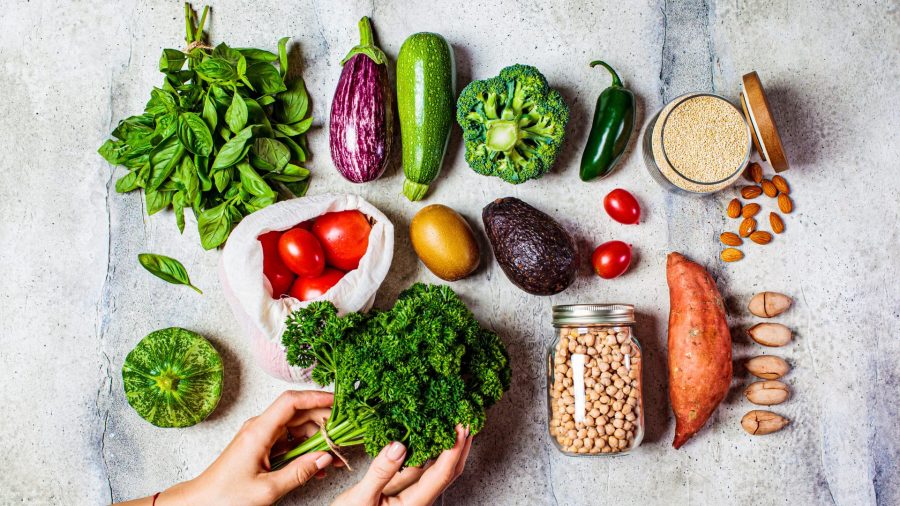A Beginner’s Guide to Cooking With Plant Based Chicken at Home
A Beginner’s Guide to Cooking With Plant Based Chicken at Home
Blog Article
Everything About Healthy And Balanced Food: Advantages of Taking On Plant Based Options
The conversation surrounding plant-based diet regimens has actually gained substantial attention in recent times. Several people are exploring the prospective wellness benefits, nutritional benefits, and environmental effects associated with these dietary options. As individuals become extra familiar with their food's influence on well-being and sustainability, concerns arise about the usefulness of taking on such a way of living. What particular modifications can one anticipate, and just how might these selections reshape not only individual health but additionally the earth's future?
Understanding Plant-Based Diet Regimens
Several individuals connect plant-based diets mainly with vegetarianism or veganism, these diet regimens can incorporate a wide array of eating patterns that focus on whole, minimally refined plant foods. Such diets often include fruits, veggies, entire grains, nuts, seeds, and vegetables, while restricting or eliminating animal items. This versatility permits people to tailor their dietary selections according to individual preferences and nutritional requirements. Some may embrace a mostly plant-based diet while still periodically consuming meat or dairy products, often referred to as a flexitarian technique. The emphasis continues to be on incorporating more plant foods, which can cause a varied variety of dishes and flavors. Understanding these various interpretations of plant-based consuming is essential for appreciating its availability and appeal in modern food society.
Health And Wellness Advantages of Plant-Based Foods
The wellness benefits of plant-based foods are substantial, using a nutrient density benefit that supports overall health. Study indicates that these foods can improve heart health and play a crucial function in efficient weight monitoring. By including a lot more plant-based alternatives, individuals may improve their dietary choices and advertise long-lasting wellness.
Nutrient Density Advantage
Nutrient thickness plays an essential duty in the health and wellness benefits of plant-based foods, making them an engaging choice for those looking for a balanced diet plan. Plant-based foods, such as fruits, veggies, beans, nuts, and whole grains, are frequently abundant in important vitamins, minerals, and anti-oxidants while being lower in calories. This high nutrient density allows people to take in fewer calories while still meeting their dietary needs. In addition, these foods are loaded with dietary fiber, advertising digestion wellness and aiding in weight monitoring. By incorporating nutrient-dense plant-based choices, consumers can enhance their overall health, support their immune systems, and decrease the danger of chronic illness. Ultimately, the nutrient density of plant-based foods highlights their relevance in a health-conscious lifestyle.
Heart Wellness Improvement

Weight Monitoring Support
Along with promoting heart wellness, a plant-based diet regimen can substantially help in weight management. This dietary strategy highlights whole foods such as fruits, vegetables, vegetables, nuts, and entire grains, which are typically reduced in calories and higher in fiber contrasted to animal-based products. The high fiber content aids raise satiation, minimizing general calorie intake. Plant-based diet regimens are typically abundant in vital nutrients while low in unhealthy fats, making it easier to keep a healthy and balanced weight. Research indicates that individuals who embrace a plant-based lifestyle often tend to have reduced body mass indexes (BMIs) and experience even more successful weight reduction compared to those that take in meat-heavy diet regimens. Welcoming plant-based choices is a critical choice for efficient weight administration.
Nutritional Value of Plant-Based Active Ingredients
Plant-based components are rich in crucial nutrients, offering a diverse variety of vitamins, minerals, and antioxidants that add to general health. A contrast of protein sources reveals that while animal products are commonly considered as remarkable, lots of plant-based choices offer appropriate healthy protein and various other valuable compounds. Comprehending the dietary value of these ingredients can help people make notified nutritional selections.
Essential Nutrients in Plants
Nutrient-rich components found in plants offer a diverse range of vital minerals and vitamins that contribute considerably to general health. These ingredients are rich in vitamins A, C, and K, which support immune feature, vision, and blood clotting, respectively. On top of that, plants offer essential minerals such as potassium, magnesium, and calcium, critical for heart health, muscular tissue feature, and bone toughness. The presence of fiber in plant-based foods help digestion and advertises a healthy gut microbiome. Anti-oxidants, discovered generously in vegetables and fruits, aid battle oxidative stress and lower inflammation. Moreover, several plant foods are low in calories yet high in nutrients, making them an excellent selection for those seeking to keep a healthy and balanced weight while ensuring view suitable nutrient intake.
Comparing Healthy Protein Resources
Healthy protein resources vary substantially in their nutritional profiles, with plant-based ingredients using unique benefits. Unlike animal healthy proteins, which frequently have hydrogenated fats and cholesterol, plant proteins have a tendency to be lower in these harmful elements. Legumes, nuts, seeds, and entire grains are rich in vital amino acids, fiber, vitamins, and minerals. As an example, lentils give high protein material together with significant iron and folate, while quinoa is a complete healthy protein, providing all 9 crucial amino acids. Additionally, plant-based proteins are commonly accompanied by antioxidants and phytochemicals that sustain overall health and wellness. The change to plant-based healthy protein resources not just improves dietary consumption however also aligns with sustainable nutritional practices, minimizing environmental influence and advertising lasting wellness advantages.
Ecological Influence of Plant-Based Eating
As recognition of climate adjustment expands, several people are discovering sustainable nutritional options that can significantly minimize their ecological impact. Plant-based consuming has emerged as a considerable factor to lowering greenhouse gas exhausts, which are primarily connected with livestock production. The cultivation of fruits, veggies, grains, and vegetables generally requires less sources, such as water and land, compared to pet farming. In addition, plant-based diet plans can lead to reduced logging, as less land is needed for grazing livestock or expanding animal feed. By shifting towards plant-based alternatives, customers can sustain biodiversity and promote healthier communities. Generally, accepting plant-based eating not just advantages individual wellness but also represents an essential action towards ecological sustainability and conservation initiatives.
Conquering Common Misconceptions
While lots of individuals recognize the benefits of a plant-based diet plan, numerous false impressions typically hinder them from totally embracing this lifestyle. A common idea is that plant-based diet plans lack adequate healthy protein; however, countless plant resources, such as vegetables, nuts, and tofu, provide ample healthy protein. Furthermore, some presume that this diet is costly, when as a matter of fact, staples like beans, rice, and seasonal veggies can be fairly budget-friendly. Another misunderstanding is that plant-based consuming is extremely limiting, whereas it really offers a varied variety of flavors and foods. Several fret that a plant-based diet regimen may lead to shortages, yet with proper preparation, individuals can acquire all essential nutrients, consisting of vitamins and minerals, while taking pleasure in a large range of tasty dishes. Broad Tips for Transitioning to a Plant-Based Way of life
Making the shift to a plant-based lifestyle can be an improving experience, though it frequently needs some support to navigate the preliminary changes. First, people are motivated to start gradually, incorporating more fruits, vegetables, beans, and whole grains into their meals while reducing meat and dairy intake. Meal planning is necessary; preparing a regular menu can help alleviate the adjustment and protect against final harmful options. Exploring cooking methods and new dishes can likewise improve the experience and maintain enjoyment about plant-based eating. Furthermore, signing up with assistance groups or areas can supply inspiration and share useful pointers. Remaining informed concerning nourishment warranties well balanced meals, preventing shortages while cultivating a healthy, gratifying plant-based lifestyle.

Delicious Plant-Based Meal Concepts
Exploring tasty plant-based meal concepts can inspire people to accept a more nutritious diet. One preferred choice is a passionate quinoa salad, including cherry tomatoes, cucumber, and a vibrant lemon-tahini dressing. One more favorite is a savory lentil stew, loaded with carrots, celery, and aromatic herbs, perfect for a soothing dinner. For breakfast, over night oats made with almond milk, find out this here chia seeds, and covered with fresh berries offer a nutritious start to the day. Furthermore, a dynamic veggie stir-fry with tofu and a range of colorful veggies can be a fast yet pleasing meal. Lastly, luscious avocado toast on whole-grain bread, sprinkled with flavors and seeds, supplies a straightforward yet savory treat. These meals showcase the variety and richness of plant-based eating.

Regularly Asked Questions
Can a Plant-Based Diet Provide Sufficient Protein?
The question of whether a plant-based diet regimen can provide sufficient protein is usual. Numerous sources, including vegetables, nuts, seeds, and entire grains, can meet healthy protein requires efficiently, supporting a healthy and well balanced diet plan for individuals.
Are Plant-Based Diets Appropriate for Children?
The viability of plant-based diets for children relies on mindful preparation. Sufficient nutrients need to be assured, including minerals, vitamins, and healthy proteins. With appropriate advice, such diet plans can support healthy and balanced growth and development in children.
Exactly how Do I Dine Out on a Plant-Based Diet regimen?
Eating out on a plant-based diet includes seeking restaurants with diverse food selections, asking for adjustments, and discovering vegan-friendly choices. Planning ahead and communicating nutritional choices can improve the eating experience while keeping dietary selections.
What Prevail Allergens in Plant-Based Foods?
Common irritants in plant-based foods consist of soy, gluten, nuts, and seeds - Sugar Free Sauces. Individuals adhering to a plant-based diet needs to recognize these allergens and check out labels carefully to avoid unfavorable reactions and ensure safe usage
Can Plant-Based Diets Assist With Weight Management?
Study shows that adopting a plant-based diet plan might help with weight reduction as a result of its generally lower calorie density and greater fiber material. This combination can enhance satiation, assisting individuals handle their calorie intake properly. Many people associate plant-based diet plans primarily with vegetarianism or veganism, these diets can incorporate a broad variety of eating patterns that prioritize whole, minimally refined plant foods. Nutrient density plays a crucial function in the health and wellness benefits of plant-based foods, making them an engaging option for those seeking a balanced diet. Plant-based diet plans have actually been revealed to substantially enhance heart health, as they frequently consist of components that sustain cardio function. In addition to advertising heart health and wellness, a plant-based diet plan can substantially help in weight management. A typical idea is that plant-based diet regimens do not have sufficient protein; visit this website nonetheless, numerous plant resources, such as vegetables, nuts, and tofu, offer adequate healthy protein.
Report this page